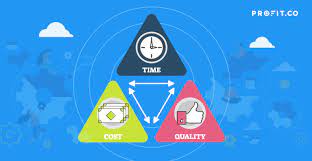“`html
The Importance of Effective Resource Management
Resource management plays a crucial role in the sustainable development of societies and the preservation of our environment. It involves the planning, allocation, and utilization of resources to achieve specific goals efficiently and effectively.
Optimizing Resource Allocation
Effective resource management ensures that resources such as natural materials, finances, human capital, and time are allocated optimally. By carefully planning how resources are distributed and utilized, organizations can enhance productivity, reduce waste, and improve overall performance.
Sustainability and Conservation
Resource management is essential for promoting sustainability and conservation. By implementing strategies to minimize resource depletion and environmental impact, we can protect valuable natural resources for future generations. This includes practices such as recycling, energy efficiency measures, and responsible consumption.
Risk Mitigation
Proper resource management helps mitigate risks associated with resource scarcity or mismanagement. By diversifying resource options, developing contingency plans, and monitoring resource usage trends, organizations can better adapt to unforeseen challenges and ensure continuity of operations.
Enhancing Decision-Making
Effective resource management provides decision-makers with valuable insights into resource availability, utilization patterns, and potential areas for improvement. Data-driven decision-making based on accurate resource information leads to informed choices that support organizational goals and long-term sustainability.
The Future of Resource Management
As global challenges such as climate change and population growth continue to impact resource availability, the need for innovative resource management practices becomes increasingly important. Embracing technology, fostering collaboration among stakeholders, and adopting sustainable practices are key steps towards ensuring a resilient future for our planet.
“`
Effective Resource Management: 6 Essential Tips for Optimizing Productivity
- Set clear objectives and prioritize tasks based on importance and urgency.
- Allocate resources efficiently by matching skills to tasks and avoiding overloading individuals.
- Monitor resource usage regularly to identify any inefficiencies or bottlenecks.
- Adapt resource allocation as needed based on changing priorities or unexpected developments.
- Utilize technology and tools to streamline resource management processes and improve productivity.
- Encourage open communication among team members to ensure transparency and collaboration in resource allocation.
Set clear objectives and prioritize tasks based on importance and urgency.
Setting clear objectives and prioritizing tasks based on their importance and urgency is a fundamental tip for effective resource management. By defining specific goals and determining which tasks require immediate attention, organizations can allocate resources efficiently to maximize productivity and achieve desired outcomes. This approach helps streamline decision-making processes, enhance focus on critical activities, and ensure that resources are utilized in a strategic manner to drive success.
Allocate resources efficiently by matching skills to tasks and avoiding overloading individuals.
Efficient resource management involves strategically matching skills to tasks and avoiding overloading individuals. By carefully assigning responsibilities based on employees’ strengths and expertise, organizations can maximize productivity and ensure that resources are utilized effectively. Overloading individuals can lead to burnout, decreased performance, and potential resource wastage. Therefore, by balancing workloads and optimizing task assignments, companies can enhance efficiency, employee satisfaction, and overall success in achieving their goals.
Monitor resource usage regularly to identify any inefficiencies or bottlenecks.
Regularly monitoring resource usage is a critical tip in effective resource management. By keeping a close eye on how resources are being utilized, organizations can quickly identify any inefficiencies or bottlenecks that may be hindering optimal performance. This proactive approach allows for timely adjustments to be made, ensuring that resources are allocated efficiently and that potential issues are addressed promptly. Through continuous monitoring, organizations can streamline operations, improve productivity, and ultimately enhance their overall resource management strategies.
Adapt resource allocation as needed based on changing priorities or unexpected developments.
“`html
Adapting resource allocation as needed is a crucial aspect of effective resource management. By remaining flexible and responsive to changing priorities or unexpected developments, organizations can optimize their resources to meet evolving demands efficiently. This proactive approach allows for swift adjustments in resource distribution, ensuring that critical needs are addressed promptly and resources are utilized in the most strategic manner possible.
“`
Utilize technology and tools to streamline resource management processes and improve productivity.
Embracing technology and utilizing specialized tools can significantly enhance resource management processes, leading to increased efficiency and productivity. By leveraging software solutions, automation, and data analytics, organizations can streamline resource allocation, track usage patterns, and make informed decisions in real-time. This proactive approach not only optimizes resource utilization but also allows for better forecasting and strategic planning, ultimately contributing to overall success and sustainability.
Encourage open communication among team members to ensure transparency and collaboration in resource allocation.
“`html
Encouraging open communication among team members is a vital tip for effective resource management. By fostering transparency and collaboration in resource allocation, teams can streamline decision-making processes and ensure that resources are utilized efficiently. Clear communication helps team members understand project priorities, share insights on resource needs, and collectively work towards common goals. This collaborative approach not only enhances productivity but also builds a culture of trust and accountability within the team.
“`

